Educational Services
Page Navigation
- Educational Services
- Charter Schools
- Educational Services-Deputy Superintendent's Office
- Learning Continues: TK - 6 Grades
- Local Control and Accountability Plan (LCAP)
- LREBG Interim Expenditure
- Research and Evaluation
- SAUSD Framework for the Future
- Support Services
- Extended Learning Programs
- College and Career Readiness
- Multi-tiered System of Support (MTSS)
- Progress Monitoring Dashboard
- School Plan for Student Achievement
- Special Education/SELPA
- Teaching & Learning Interactive Guide
-
Teaching & Learning
- Advanced Placement
- Athletics and Wellness Programs
- AVID
- Career Technical Education
- College & Career Readiness
- Communication Access Realtime Translation (CART)
- Early Childhood Education
- Early Childhood Education
- Elementary Report Card Guides in English
- Elementary Report Card Guides in Spanish
- Elementary Report Cards, Explained (Interactive)
- English Learner Programs
- English Learner Services
- Ethnic Studies
- Expanded Learning
- FACE
- Family and Community Engagement (FACE)
- High School Diploma eligibility - SB 172
- SAUSD ARTS (Visual and Performing Arts)
- Secondary ELA/ELD Instructional Materials Adoption Process 2017/18
- Section 504
- Support Services
- Teacher Induction & Professional Support
- The Arts
- TIPS
- Universal PreKindergarten (UPK)
- Uniform Complaint Procedure
- We Care
- Williams Uniform Complaint
-
SAUSD Secondary Education ELA/ELD Instructional Materials Adoption Process 2017-18
Oct. 25, 2016- 2015 CCSESA ELA/ ELD Adoption Toolkit training at OCDE. Attended by April Baxter and Jason Crabbe, Secondary ELA Curriculum Specialists. Trained by Allison Granger at OCDE
January 10, 2017- Instructional Materials Network Meeting at the OCDE
Attended by SAUSD’s ELA Adoption Team
Topics included:
- Rubrics and rating processes for instructional materials
- Final recommendation process
- Considerations for curriculum roll-out
March 22, 2017- Met with the Math Curriculum Specialists to review their Math adoption process
April 27, 2017- ELA Dept. Chair Meeting- Dept. chairs were encouraged to review the instructional materials that are available and they were given links to Ed Reports reviews and links and access to review all publishers that offer program 2 resources. The document below is what the teachers were given:
May 3, 2017- 2016-17 ELA/ELD Instructional Materials Network meeting at OCDE
May 19, 2017- Amplify presentation to the Intermediate School Curriculum Committee at Mendez Intermediate School from 9:00am-11:00am.
May 22, 2017- Int. School Dept. Chair Meeting- Reviewed materials and created a purpose map for instruction materials shown below as Figure 1.
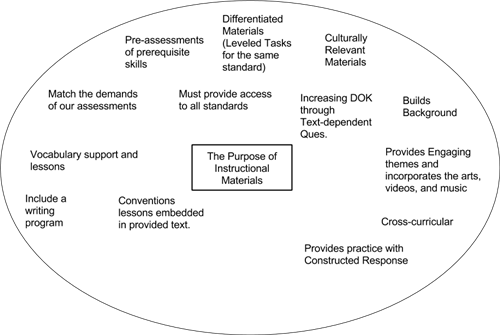 Figure 1
Figure 1June 8, 2017- Pearson MyPerspectives presentation to Intermediate School and High School Dept. Chairs 3:00-4:30.
Sept. 1, 2017- High School ELA Curriculum Committee Meeting- Teachers reviewed SAUSD’s Theoretical Framework (Figure 2) and then created their own Purpose of Instructional Materials Circle Map (Fig.3).
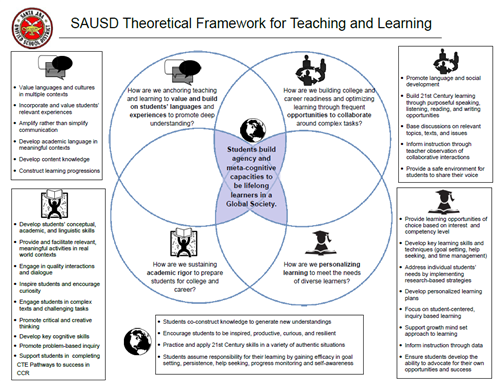 Figure 2
Figure 2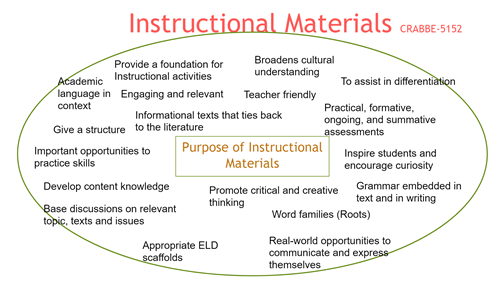 Figure 3
Figure 3In addition to the Purpose Map, teachers also completed a MSCW chart to establish what the instructional programs that we are looking at Must Have, Should Have, Could Have and Won’t Have. This can be seen in Figure 4. After creating this chart however, teachers felt that the circle map is a better indicator of what we’d like to see in the program that we will ultimately adopt.
September 13, 2017- - High School Dept. Chair Meeting- Teachers Reviewed the Instructional Materials. They reviewed the ED Reports analysis of each program, they filled out Task 2.2a- which is a general rubric that helps to narrow the field of adoption materials under review. After completing the rubrics and discussing their results, Teachers unanimously chose to pilot Pearson’s MyPerspectives and McGraw Hill’s Study Sync.
September 14, 2017- Intermediate School Dept. Chair Meeting- Teachers Reviewed the Instructional Materials. They reviewed the ED Reports analysis of each program, they filled out Task 2.2a- which is general rubric that helps to narrow the field of adoption materials under review. After completing the rubrics and discussing their results, Teachers unanimously chose to pilot Pearson’s MyPerspectives and McGraw Hill’s Study Sync.
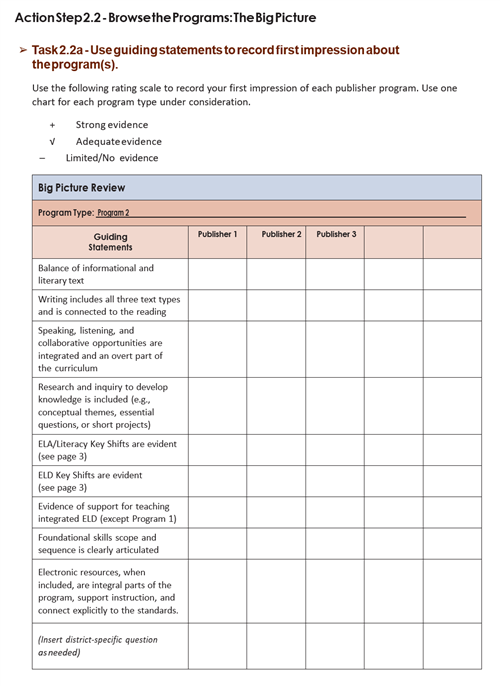 Figure 5
Figure 5September 21, 2017- McGraw Hill and Springboard presented their programs to High school Dept. Chairs so that the Dept. Chairs could make a decision for the second program that SAUSD will pilot for Grades 9-11. They had previously chosen to pilot Pearson's MyPerspectives as one of the pilot programs. At the conclusion of this meeting there was a unanimous decision to pilot McGraw Hill's Study Sync.
September 25, 29, and 30th, 2017- All Secondary ELA Pilot Teachers were given a full-day's training on the the ELA/ELD Framework. Teachers collaborated around activities that asked them to do a "deep dive" into each theme covered in the Framework. This group used their expertise and depth of knowledge to create an evaluation tool (Figure 6) that will be used to evaluate the instructional materials that will be piloted in the classrooms.
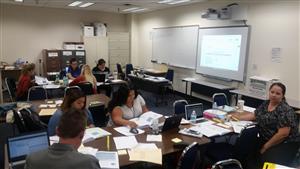
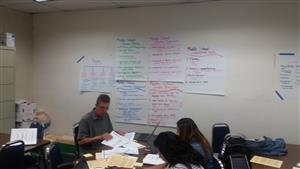
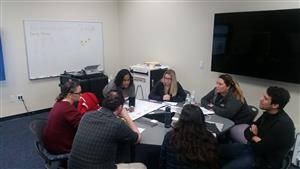
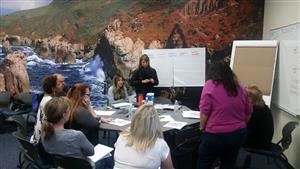
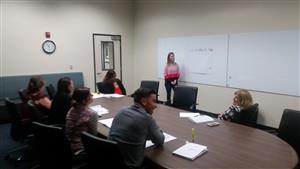
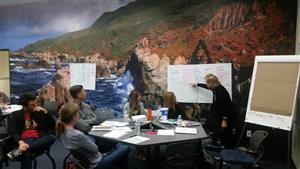
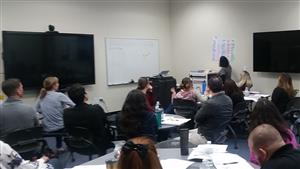
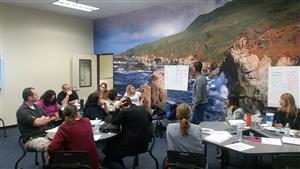
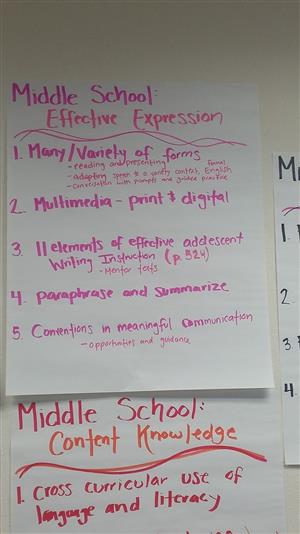
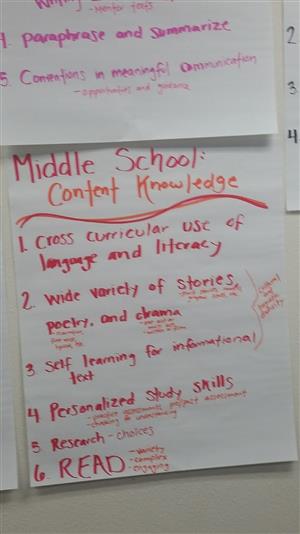
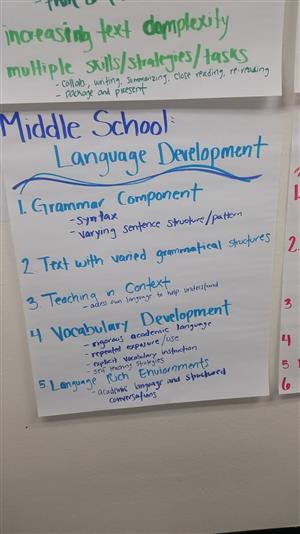
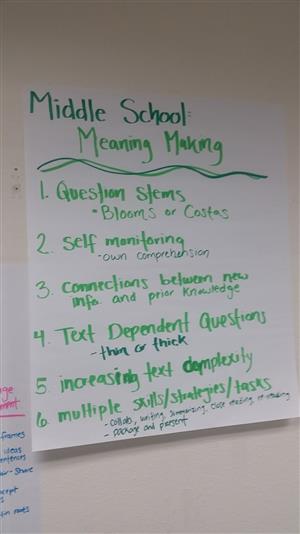
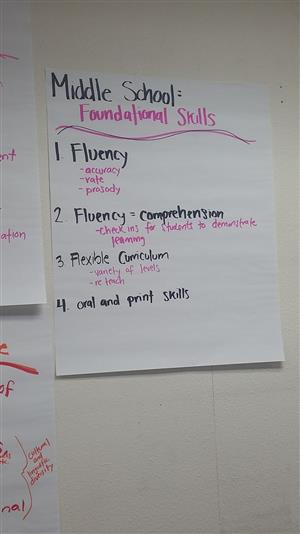
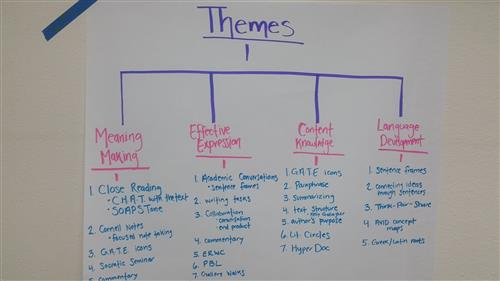
SAUSD Secondary ELA Instructional Materials Evaluation Rubric
Category
Rating
Comments/Questions
Text Quality
● Texts are engaging and rigorous, containing rich academic language, meeting appropriate complexity criteria for each grade
● Anchor texts consist of a variety of lexile levels, perspectives, and genres
● Balance of informational and literary text
● Culturally diverse and relevant texts
❏ 4- Extensive
❏ 3-Sufficient
❏ 2-Some
❏ 1-Weak/None
❏ Not Evaluated
Meaning Making
● Big Ideas and Essential Questions provide opportunities for students to identify and analyze the central ideas and the relationship between ideas in a text
● Provides opportunities for students to identify the impact of the author’s choices on the meaning of a text
● Provides opportunities for students to make connections between new information and prior knowledge
● High quality sequences of text-dependent questions are prevalent in the materials and build to a deep understanding of the text and text structures
● Instructional materials provide opportunities for students to determine central themes or ideas including:
○ Citing evidence
○ Integrating multiple modalities relevant to background and the text
● Provides opportunities for students to grapple with multiplicity of sources, author motivations, representations, perspectives, themes, and ideas while allowing students to analyze rhetorical features and synthesize multiple sources of information
● Materials to teach credibility/vetting of sources
❏ 4- Extensive
❏ 3-Sufficient
❏ 2-Some
❏ 1-Weak/None
❏ Not Evaluated
Content Knowledge
● Provides cross-curricular use of language and literacy
● Provides a wide variety of stories, poetry, and drama (culturally and linguistically diverse texts)
● Opportunities for students to read informational texts independently to build contextual knowledge
● Provides personalized study skills (practice tests, pre/post assessments)
● Accommodates student choice in research process
● Anchor text with ancillary/support texts from varied genres that support skill and content development
● Provides students the opportunity to build understanding through inquiry-based learning
❏ 4- Extensive
❏ 3-Sufficient
❏ 2-Some
❏ 1-Weak/None
❏ Not Evaluated
Effective Expression
● Provide opportunities for students to develop their ability to use language for clarity, precision, variety, and appropriateness to the task, purpose, and audience
● Provides students opportunities to paraphrase and summarize
● Provides students opportunities to use appropriate conventions in meaningful communication
● Provides tasks to express knowledge in a variety of forms (multimedia, speeches, academic conversations, presentations, etc)
● Availability of writing models, graphic organizers, and other support materials to develop writing proficiency
● Suggestions for modeling effective expression (videos or sentence frames)
❏ 4- Extensive
❏ 3-Sufficient
❏ 2-Some
❏ 1-Weak/None
❏ Not Evaluated
Language Development
● Opportunities provided for students to analyze the cumulative impact of word choices, syntax, and figurative language in the meaning of the text
● Opportunities to examine the denotative and connotative meaning of words
● Opportunities for listening, speaking, reading and writing practice (independently, pairs, small groups, whole class)
● Incorporates language forms and features for students to express their own ideas and construct arguments as appropriate to purpose, audience, and a range of formal and informal academic tasks
● Provides students with strategies to make them independent vocabulary learners
❏ 4- Extensive
❏ 3-Sufficient
❏ 2-Some
❏ 1-Weak/None
❏ Not Evaluated
Language Conventions
● Materials include opportunities to apply knowledge of Greek, Latin, and Anglo-Saxon roots and affixes to draw inference concerning the meaning of new words
● Materials include explicit instruction and repeated exposure to foundational and specialized vocabulary
● Directly integrate vocabulary into materials to reinforce acquisition and mastery of language conventions and academic vocabulary acquisition
❏ 4-Extensive
❏ 3-Sufficient
❏ 2-Some
❏ 1-Weak/None
❏ Not Evaluated
Speaking and Listening
● Materials encourage students, through directions and modeling, to use academic language in speech
● Guiding questions and suggested activities (fishbowl, Socratic seminar, etc.) that provide students with opportunities to speak and listen
● Supports to help students generate their own questions
● Frequent opportunities for productive, collaborative discussions
❏ 4- Extensive
❏ 3-Sufficient
❏ 2-Some
❏ 1-Weak/None
❏ Not Evaluated
Differentiation
● Embedded, appropriately scaffolded texts and activities that are based around student competency levels from ELD to advanced
● Provide supplemental opportunities based on student interests for extended learning.
● Ideas for small-group instruction (mini-lessons, large group)
● Embedded reading, writing, and language activities that build upon previous skill level achieved
❏ 4- Extensive
❏ 3-Sufficient
❏ 2-Some
❏ 1-Weak/None
❏ Not Evaluated
Instructional Planning/Teacher Support
● Lessons provide context and purpose that is authentic, meaningful and purposeful to students
● Embedded checks for understanding and suggestions for re-teaching targeted learning outcomes that are CCSS aligned
● Essential questions tied to big idea(s)
● Activities aligned with CCSS targets and claims
● Ancillary/scaffolded materials that support students in building schema for embedded CCSS skills (say, mean, matter, writing components, etc.)
● Texts are sequenced in a manner that builds and spirals skills
● Supporting materials include answer keys, rubrics, and/or scoring guidelines that are clearly connected to the targeted CCSS and provide sufficient guidance for interpreting student performance
● The activities cultivate student engagement in reading, writing, and speaking about text
❏ 4- Extensive
❏ 3-Sufficient
❏ 2-Some
❏ 1-Weak/None
❏ Not Evaluated
Technology
● Digital/Technological resources (audio, visuals, current informational texts) are embedded into the curriculum
● Text-relevant video/media clips
● Online component, preferably compatible with Google Classroom
● Contains adaptive technology that supports differentiation based on individual student performance
❏ 4- Extensive
❏ 3-Sufficient
❏ 2-Some
❏ 1-Weak/None
❏ Not Evaluated
Guided and Independent Practice
● Differentiated text-dependent questions
● Skills are explicitly taught and include multiple opportunities for mastery
● Suggestions for re-teaching
● Multiple avenues to help students develop critical reading, writing, listening, speaking and thinking skills
❏ 4- Extensive
❏ 3-Sufficient
❏ 2-Some
❏ 1-Weak/None
❏ Not Evaluated
Foundational Skills
● Sequence of instruction is thoughtful
● Provides flexible curriculum and ability to teach and re-teach at a variety of levels
● Intervention support provided for struggling students
● Provides opportunities to develop foundational literacy skills including:
○ Reading with sufficient accuracy and fluency to support comprehension
● Independent practice options for ELD students who are in a CP class but have severe gaps in foundational language skills
❏ 4- Extensive
❏ 3-Sufficient
❏ 2-Some
❏ 1-Weak/None
❏ Not Evaluated
Assessments
● A variety of traditional and 21st Century tech-based assessment frames and systems that align with CCSS are provided
○ Pre-assessment, progress monitoring, and culminating assessments
○ Informal and formal assessment options
○ Analytical based assessments
○ Collaborative and independent assessment options
○ Adaptive assessments
○ Project-based learning
○ Performance Tasks
❏ 4- Extensive
❏ 3-Sufficient
❏ 2-Some
❏ 1-Weak/None
❏ Not Evaluated
October 2, 2017- High School Instructional Materials Training
McGraw Hill and Pearson both came to train the teachers that would be piloting their programs. This was a full-day training.
October 9, 2017- Intermediate School Instructional Materials Training
McGraw Hill and Pearson both came to train the teachers that would be piloting their programs. This was a full-day training.
October 16, 2017- First day of High School Pilot!
Mon.
10/16/17
High School Fall Pilot Begins
This will be the first day of classroom implementation of the unit that has been selected as the pilot unit for each grade level.(The unit chosen should coincide with a unit within our current curriculum map as much as possible)
Monday 10/23/17
Intermediate School Pilot Begins
This will be the first day of classroom implementation of the unit that has been selected as the pilot unit for each grade level.(The unit chosen should coincide with a unit within our current curriculum map as much as possible)
Mon.
11/6/17
DO- Rm. 106 A&B
3:00- 4:30
High School Pilot Check-in #1 and Survey Due
Pilot teachers will voice their observations and experiences in working with the adoption materials, they will complete surveys and pose questions that they want the publisher to answer. (3 surveys for program 1, 3 surveys for program 2, and one final survey at the very end of the process)
Thu.
11/9/17
3:00-4:30
DO- Rm. 106 A&B
Intermediate Pilot Check-in #1 and Survey Due
Pilot teachers will voice their observations and experiences in working with the adoption materials, they will complete surveys and pose questions that they want the publisher to answer. (3 surveys for program 1, 3 surveys for program 2, and one final survey at the very end of the process)
Mon.
12/11/17
8;30-2:30
Study Sync- CLAS Office;
Pearson-Flex Lab 125
High School Check-in # 2 and Survey due
And Materials training (Opposite Program than what they are piloting)
Pilot teachers will voice their observations and experiences in working with the adoption materials, they will complete surveys and pose questions that they want the publisher to answer. (3 surveys for program 1, 3 surveys for program 2, and one final survey at the very end of the process)
Fri.
12/15/17
8:00 am - 2:30pm
Pearson- Board Room
McGraw Hill- Lab 125
Intermediate School Materials training (Opposite Program than what they are piloting) and Check-in #2 and survey
Pilot teachers will voice their observations and experiences in working with the adoption materials, they will complete surveys and pose questions that they want the publisher to answer. (3 surveys for program 1, 3 surveys for program 2, and one final survey at the very end of the process)
12/11/17- 1/19/18
Secondary Instructional Materials Observations
Teachers observe ELA lessons of materials they are not piloting and then provide feedback
Thursday
1/11/18 -
3:00-4:30
Rm. 106 A&B
High School Check-in # 3 and Survey due
Pilot teachers will voice their observations and experiences in working with the adoption materials, they will complete surveys and pose questions that they want the publisher to answer. (3 surveys for program 1, 3 surveys for program 2, and one final survey at the very end of the process)
Tuesday.
1/16/18
3:00 pm - 4:30pm
Rm. 106 A&B
Int. School Pilot Check-in #3
Pilot teachers will voice their observations and experiences in working with the pilot materials, share questions, revisit SAUSD priorities for instructional materials; they will complete surveys and pose questions that they want the publisher to answer. (3 surveys for program 1, 3 surveys for program 2, and one final survey at the very end of the process)
Wed.
1/24/18
3:00-4:30
Flex Lab 125
High School Pilot Debrief
Forum for Synthesizing their experiences with the curriculums, debrief the collected data
1/25/18
3:00-4:30
Flex Lab 125
Intermediate School Debrief
Forum for Synthesizing their experiences with the curriculums, debrief the collected data

